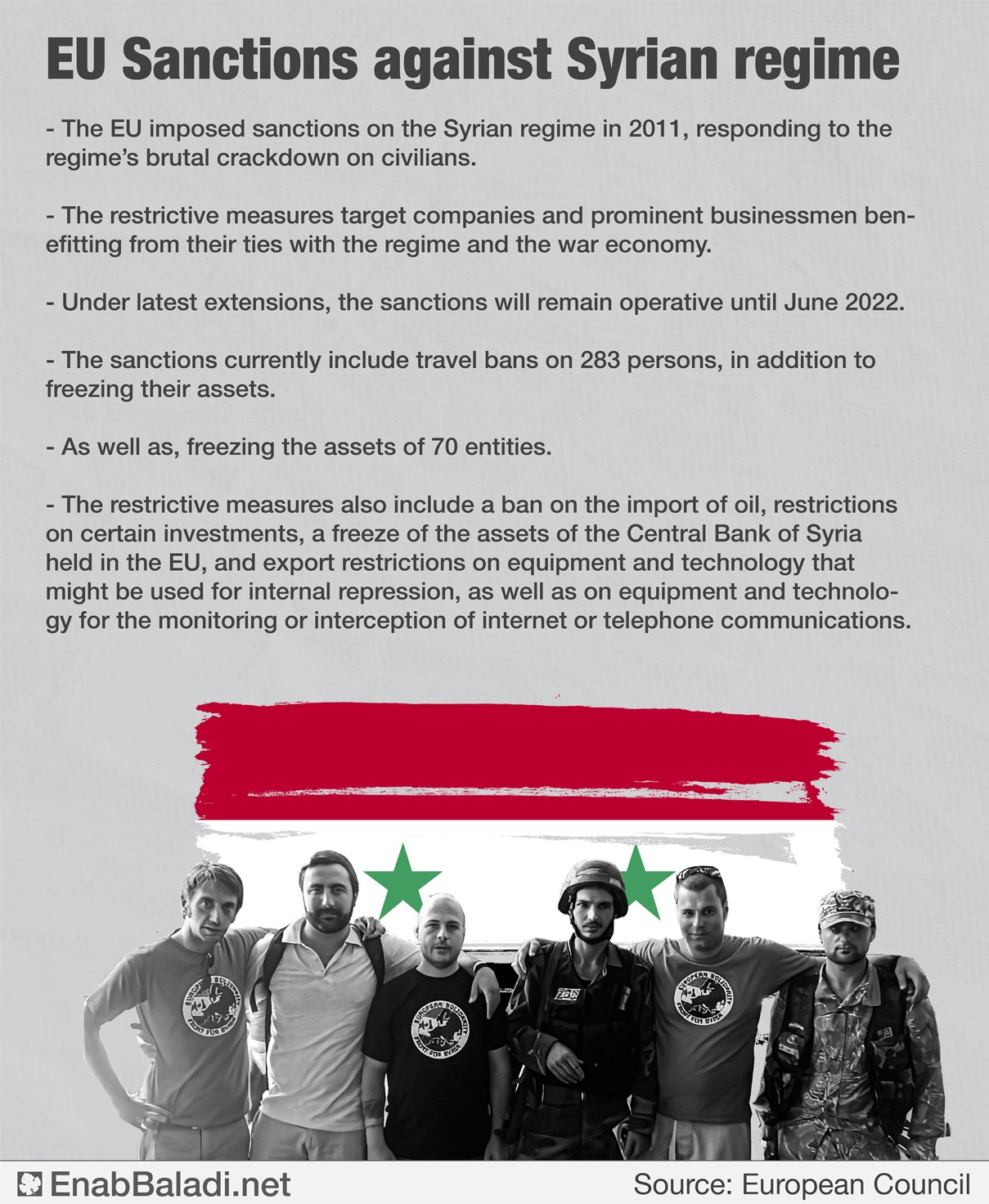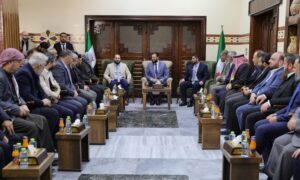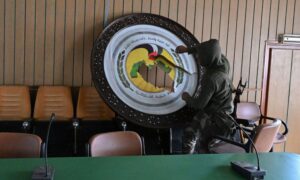Western NGOs bracing al-Assad’s propaganda in Europe: How to challenge that?


Saleh Malas| Diana Rahima| Khaled Jeraatli
A number of non-government organizations (NGOs), licensed in Europe and other Western countries, are ramping up pro- Syrian regime activities and bracing its propaganda. They are launching media and popular campaigns to advocate the regime narrative, or sending groups to Damascus to express their support for the head of the regime, Bashar al-Assad, in the so-called “war on terrorism.”
In its turn, the Syrian regime has been investing in these tokens of support, calling it “European rapprochement” on the path towards the normalization of ties. The regime’s claims are at odds with the European official stand on the Syrian affair. The European Union (EU) refuses to normalize relations with Damascus or partake in Syria’s reconstruction unless a political change is achieved in line with United Nations (UN)’s resolutions, notably Resolution No. 2254.
This propagandist coordination is neither new nor specific to the Syrian regime. Regimes across the Middle East often cooperate with nongovernment organizations to advocate their policies and propaganda and help them sway Western public opinion. These organizations might even provide regimes with logistic support or commercial, military, or intelligence deals that guarantee their stay in power.
However, the unique side to this cooperation within the Syrian context is that these NGOs have grounded their advocacy on several Syria-related controversial issues, most importantly the issue of Syrian refugees, with the number of asylum seekers peaking in 2015, weighing down the EU since then, as well as the hike in the number of alleged “terrorist attacks” that are constantly blamed on immigrants and refugees.
These NGOs operate across the EU, offering the regime various forms of support to urge Western communities into politically embracing the regime’s narrative of “war on terrorism.”
In this in-depth article, Enab Baladi profiles key pro-regime NGOs in Europe and reveals some of their open and sometimes secret forms of support. Additionally, Enab Baladi investigates whether there are any legal means to hold these organizations accountable when proven as having been involved in violations of the laws of their countries of registration.
Local laws and international sanctions breached
The sanctions imposed on Syria since 2011, spearheaded by Washington and the EU, are by far the most overreaching. Nevertheless, these sanctions have apparently failed to prevent numerous Western NGOs from backing the Syrian regime over the past 10 years.
Neglecting both local laws and international treaties, some of these NGOs have been implicitly and explicitly cooperating with the regime’s government to fund regime-affiliated military groups or reinforce its “war on terrorism” narrative inside Syria.
A member of the Board of Directors of the Syrian Christians for Peace (SCP) organization, Samira al-Mubayed, told Enab Baladi that civic action plays an important role in influencing public opinion. Taking cues from this, the regime supported and established organizations to spread its narrative and allegations within communities in their countries of registration.
She added that keeping tabs on these NGOs’ activities, or countering their pro-regime claims, is not always easy because the regime has large-scale networks, which it has firmly established over the course of its rule.

Campaign by right-wing parties in Denmark, calling for the return of Syrian refugees to Syria since the country has become “safe” — April 2021 (Activists on social media)
These NGOs have different frames for their activities. Some organizations opt for producing cultural materials that advocate the regime’s theories indirectly, or by covering their support under labels such as charity work, gender- or service-related activities, among others.
The Executive Director of Syria Justice and Accountability Centre (SJAC), Mohammad al-Abdallah, told Enab Baladi that these NGOs are registered in the countries where they are headquartered. However, registration alone does not make an organization’s work legal. Actually, all the organizations’ activities and measures must be in line with the local laws of the countries of registration.
He added that, to be considered legal, these organizations must also refrain from breaching the international sanctions imposed on a certain State.
To put this in context, al-Abdallah gave the following example. Even though the sale of weapons is legal in France; France-based organizations cannot sell weapons in Libya. This is because in Libya a ban has been imposed on the sale of weapons by the Security Council.
Consequently, he added, the proper approach is to monitor and assess each of these organizations’ activities independently to determine whether they are illegal, not to investigate into the pattern of the support they provide to the regime and whether it is provided openly or in secret.
Providing the regime with logistic, medical, or relief assistance is not considered a violation of local laws, not even of international treaties. However, this assistance breaches the law when an organization recognizes that the regime’s government will be using funding for purposes other than humanitarian assistance, such as using medical aid to suppress opponents or torment civilians.
Al-Abdallah said that the regime’s government can circumvent controversies relating to logistical support provided by some Western organizations through “dual-use items.” These items refer to products that are used for both civil and military purposes.
The export of dual-use materials is often subject to special laws and controls. Some countries have even banned such exports. Centrifuges, for example, can be used medically and for the manufacture of enriched uranium.
Many investigations have addressed items of dual-use. In 2019, the Danish Broadcasting Corporation (DR) reported that “the Danish company Dan-Bunkering plays a key role in a case involving illegal supplies of at least 30,000 metrics tons of jet fuel for the civil war in Syria.”
The DR said that its report is based on U.S. Court Records and confidential information possessed by Danish Authorities.
Another investigation carried out by the investigative unit of Swiss media group Tamedia— in cooperation with Pulitzer center and Daraj— inquired into four tons of Swiss chemicals that went missing in Syria, shipped into the country to be used in the production of medicines by the Mediterranean Pharmaceutical Industries (MPI).
The investigation confirmed that most of the chemicals meant to produce Voltaren never reached their destination.
The investigation said that “the missing four tons of isopropanol would allow for the production of nearly eight tons of Sarin,” which the EU bans from entering Syria.”
In 1996, Wassenaar Arrangement was established. The agreement is “a voluntary export control regime whose 42 members exchange information on transfers of conventional weapons and dual-use goods and technologies.”
Controls were put in place to monitor products export to Syria because “it has an advanced chemical weapons program and a suspected biological weapons capability.” With such a weaponry profile, Syria is considered a “risk” when allowed an influx of military capabilities, the agreement states.
Abdullah added that wireless monitoring systems can be used for peaceful purposes, but the regime’s government used them to eavesdrop on peaceful activists in the opposition. Therefore, Western governments banned the sale of such devices to Syria.
Pro-Assad Western NGOs
Enab Baladi tracked the most prominent organizations actively supporting the Syrian regime. They are mainly located in the EU countries, the US and Canada.
European Solidarity Front for Syria
The front was established in January 2013. Its key co-founders are from Italy, Greece, Cyprus, Belgium, the Netherlands, Finland, and Spain. It gained quick support and was embraced by other countries, particularly in Poland, France, the Czech Republic, Romania, as well as Ireland, Serbia, Britain, Scotland, Malta, Ukraine, Denmark, Sweden, Canada and Argentina.
Black Lily
The organization was established in Greece in 2013.
In an interview with the right-wing Greek Democratia newspaper, Stavros Lebovicis, a member of the organization’s editorial group, was asked whether the group has any volunteer forces fighting on the Assad’s side.
Lebovicis said “we have been in touch with our Syrian brothers in arms for years now and that has played an important role in our today’s presence fighting along their side.”
He added that “Greek fighters have participated in all major battles that commenced in South and West of the country the last two years and so far no casualties have been reported. It’s not a coincidence that in the fierce battle that took place in Al-Quasar [Al Qusayr] beside the praise for the heroic Hezbollah, the Greek fighters received credit for their bravery as well.”
Black Lily maintains tight relations with the European Solidarity Front for Syria.
CasaPound
CasaBound is an Italian right-wing organization. The group does not hide its admiration of former dictator Benito Mussolini, and had carried out racist protests against the Roma community and violent attacks against anti-fascists and leftists.
In 2013, a CasaBound delegation visited Damascus and announced its support for the Syrian regime and met with the Speaker of the People’s Assembly, Muhammad Jihad al-Lahham.
Another delegation visited Aleppo city in northern Syria. The delegation members back then posted photos posing in front of the Citadel of Aleppo, carrying the Italian flag and their group’s official flag.
Alternative for Germany
The Alternative für Deutschland (AFD) party was founded in 2013. Its stance was largely centralized on opposing the rescue of debt-burdened European countries such as Greece. Over time, the party also adopted an anti-immigration position against the policies pursued by German Chancellor Angela Merkel, which facilitated over 1.5 million immigrants’ access to Germany in 2015.
Six AFD members visited Syria, hoping to consolidate the party’s efforts aimed at returning half a million Syrian refugees from Germany to Syria.
The “declared” purpose of the visit, as described by Dr. Christian Blex, German Parliamentarian, AFD deputy spokesman and the trip’s organizer, was giving German politicians the chance to assess the security situation in Syria first-hand.
Syrian refugee Kevork Almassian, who is close to the AFD party and participated in a number of its conferences, had his asylum status revoked by the German immigration authority “for his fierce defense of the Assad regime, and because he was not under threat of persecution by the regime,” while he made statements such as “the security situation is stable enough.”
The Alliance for Peace and Freedom (APF)
This APF established diplomatic relations with the Syrian regime. An APF delegation visited Damascus in 2015, headed by Roberto Fiore.
The delegation expressed its support for the regime, describing what is happening in Syria as “the conflict of civilization and chaos.”
Fiore said that their mission as a “peace and freedom” delegation is to convince the European people to “stand by civilization represented by Syria and fight terrorism before it arrives in Europe.”
In 2019, the delegation visited the Lebanese capital, Beirut, and met Ammar al-Moussawi, International Relations official of Hezbollah, an ally of the Syrian regime.
The delegation expressed its support for what it described as “the important national role of [Hezbollah] in the fight against terrorists, and its position against the Israeli aggression.”
The delegation also demonstrated solidarity with “resistance against the political and media campaigns launched against [Hezbollah] by powers linked with the US-Zionist enterprise.”
Save the Christians of the Middle East
The organization was founded in France in October 2013. Shortly after, it embarked on its first mission, coded “Christmas in Syria.”
Its stated objective was to provide assistance to Christians in the Middle East. However, over time, it increasingly involved in the violence that followed The Arab Spring uprisings.
Early into its foundation, the founders neglected to provide Christian communities with humanitarian aid and moral support they had originally advocated for promoting a right-wing political agenda and spreading disinformation.
Investigating the activities of the organization, Newslines magazine said that “The unsavory relationship between SOSCO and the Assad regime, as well as a brutal pro-Assad militia based in Syria’s Hama province, has been documented in French media since SOSCO began its work in Syria in 2013.”
The magazine’s investigation also “raises questions about the extent to which — if at all — SOSCO personnel who also happen to be French military reservists might have provided al-Wakil or his militia, purposely or inadvertently, with military or field strategy advice during the seven years of SOSCO’s visitations to, and fundraising efforts for, the town of Mhardeh.”
Additionally, the investigation linked “the organization to a list of organizations identified in a letter written in April by U.S. Rep. Elissa Slotkin, chair of the House Homeland Security Committee, asking U.S. Secretary of State Antony Blinken to designate them as overseas violent white supremacy group.”
The Working Group on Syria, Propaganda and Media (SPM)
This group consists of a number of extreme-leftist British academics and researchers, who lead media campaigns against international media outlets and some humanitarian organizations, accusing them of working for the US Central Intelligence Agency (CIA) and the Secret Intelligence Service (SIS), commonly known as MI6.
The group seeks to undermine the work of the Syria Civil Defence, accusing the group of falsification evidence and promotion of civilian casualties in chemical weapons attacks.
One SPM member, conspiracy theorist Tim Hayward, retweeted a post on chemical attacks on Eastern Ghouta. He alleged that the white helmets are partners with “jihadist” factions and accused them of staging attacks, as well as faking casualties to spread misinformation about the Syrian regime.
Furthermore, British blogger Vanessa Beeley— key SPM member and fierce advocate of the regime— visited Syria on trips funded by the regime. She also accused the White Helmets of fabricating missile and chemical attacks and attributing them to the regime, to undermine it and overthrow its government.
Notably, most of these organizations and groups were established as numbers of Syrian refugees seeking asylum in European countries hiked. These organizations are using the refugees issue as a pretext to back the Syrian regime, by conveying an idea to European public opinion that the authority in Damascus is “fighting terrorism,” and it is a protector of Europe from any extremist groups that may find their way to Europe to carry out attacks there.
Out of approximately 6.7 million Syrian refugees worldwide (most of them are in countries neighboring Syria), European countries host more than one million asylum seekers and Syrian refugees. 70% of these refugees reside in two countries, Germany (59%) and Sweden (11%), according to UNHCR figures.
What does the EU say?
Under the title “Setting the record straight”, the EU addressed “misleading and false information about the European Union (EU) and ‘the West’’, the Syrian regime and allies are spreading in attempt to influence the public opinion and mobilize voters into supporting the regime.
The EU’s report, published by the Delegation of the European Union to Syria on 29 June, debunked several myths involving the situation in Syria and the role of the Syrian regime in rendering the country insecure.
The EU said, “ten years into the Syrian conflict, the Syrian regime is still trying to twist the facts. Social media platforms and mobile messaging applications have also made it easier for disinformation to spread.”
The report highlighted that “Syria remains an unsafe and discriminatory country for most of its citizens. The laws and political reforms needed to ensure the right of its citizens to live in safety are not there.”
“The United Nations High Commission for Refugees (UNHCR) regularly reviews the conditions that would be needed for organised returns to be safe. Access to the entire territory is needed for UNHCR and other mandated humanitarian organisations to monitor the situation,” the report pointed.
Touching on the EU sanctions against the Syrian regime, the report said that “the sanctions have been in place and mostly unchanged since 2011, as a reaction to the brutal repression of the civilian population. They have been recently renewed until 1 June 2022.”
Defining the purposes of these sanctions, the report added that “EU restrictive measures are designed to avoid impeding the delivery of humanitarian assistance. Exports of food, medicines or medical equipment such as respirators and ventilators are not subject to EU sanctions.”
The report also clarified that “there is no humanitarian and trade embargo on Syria. EU goods have been flowing freely into the country until 2019. Trade then went down because of the collapse of Lebanon’s banking sector, that was Syria’s main trade and financial gateway to the world but EU consumer goods, medicines etc. are not subject to sanctions and continue to enter the country.”
A third myth that the EU report refuted is normalization with the regime, promoted by the regime itself and NGOs in Europe. “Normalisation is out of the question unless the Syrian regime engages in a political transition in accordance with UN resolutions. This includes ending the repression and freeing the tens of thousands of political detainees in its prisons,” the report said.
The report added that “there have been no changes to EU Member States’ representation in Damascus in the wake of last May’s election. The reopening of embassies in Damascus by a few Member States is not new.”
“While each EU Member State has the sovereign right to decide about its diplomatic representation abroad, the presence of EU or Member States diplomats in Damascus does not mean the normalisation of relations with the regime,” the report emphasized.
Opinion Poll
Divided Syrian opinion
Enab Baladi conducted an opinion poll on its social media platforms, asking the audience whether advocacy by such NGOs would help the regime regain legitimacy.
There was an obvious divide among the nearly 1000 participants who reacted to the question. 55 percent said that the advocacy of such NGOs is unlikely to help rehabilitate the Syrian regime or press countries into embracing it. The remaining 45 percent said that these NGOs might actually help the regime regain legitimacy.
What does it take to counter these NGOs legally?
Regardless of the EU’s and other State’s political stances, cases involving grave crimes, such as war crimes and crimes against humanity are complicated per se. These cases tend to be intricate on the levels of investigation, verification, defense of victims, as well as holding perpetrators accountable.
Before searching for tools to pursue legal action against Western organizations for their support for the Syrian regime— a party accused of committing a wide range of violations against the Syrian civilian population— extensive evidence must be obtained to confirm that these organizations have violated the domestic laws of their countries of registration or international treaties and sanctions. Additionally, the essence of the violated laws must be defined as to open an investigation into the violations, al-Abdallah told Enab Baladi.
In the case involving the French-registered Save the Christians of the Middle East, it took investigators 18 months to collect and examine the evidence, to verify the organization’s affiliation with regime forces’ para-military militias. The compiled evidence included “confidential testimonies from whistleblowers, and open-source information . . . The evidence also includes a documented money trail that meets the threshold of prosecutable offenses under French law,” Newslines said.
Should international sanctions be violated, the course of action changes. Plaintiffs should determine the nature of the legal charges they will press for, especially in the case where a specific set of sanctions is violated. Under such circumstances, the organization is not sued in a legal term. However, plaintiffs document the violations and report them to the entity that has enforced this particular set of sanctions against the Syrian regime.
For instance, if an organization or a company violates the US-enforced Caesar sanctions, persons working on collecting evidence of a specific breach must send evidence to the US Department of the Treasury. The department would carry out an investigation into the reported violations, ultimately laying sanctions against the involved company. In line with US laws, the department might close the company’s accounts or designate some of its officials.
Al-Abdallah said that in the case of violations of a specific set of restrictive measures, proceedings stop being legal, becoming political. In this case, pressing for action might be “difficult to a certain extent” because the violations must be grave to motivate the international entity that imposed these measures to conduct an investigation. He added that the involved organization must be headquartered in a state that agrees to put the penalties decided at the end of the investigation into effect. The government of the country of registration might be cooperative enough to be asked to freeze the organization’s bank assets.
In the case of addressing violations through courts, which is an apolitical proceeding, individuals, who have evidence corroborating the violations committed by an organization, must seek the War Crimes Office within the Public Prosecution in the country of registration and submit compiled evidence.
Al-Abdallah said that individuals better ask for assistance from legal organizations and centers should they opt for the legal course to hold accountable an organization that acted against domestic laws while supporting the regime because these organizations and centers are experts in domestic laws and legal measures.
The lawsuit openly filed against an organization that contributed to funding regime-affiliated military groups boosts the chances of discovering extensive evidence. Because the exposure of the proceedings would help concerned sides reach out to more witnesses and victims who were directly affected or related to the violations committed by the prosecuted organizations.

Rallies across Denmark against the decisions to deport Syrian refugees to Syria —19 May 2021 (Tim Whyte)
Advocacy: pressuring donors through media
Al-Abdallah said that, in challenging pro-regime Western organizations, advocacy poses a significant option because it is less costly and less hectic than resorting to courts. However, he said, advocacy must be based on solid verified evidence to help the media shed light on concerned organizations’ activities.
Additionally, organizations are obliged to reveal their donors because they have to provide tax statements to governments at the end of every year. Accordingly, there is access to information about the donors financing pro-regime organizations, needed for pressing them through media and subsequently burden donors with financial penalties that limit their support for these organizations.
According to al-Mubayed, investigating into such organizations hinges on the independent work of individuals or civil organizations. This applies to the work carried out by Syrian Christians for Peace (SCP) that inquired into the activities of Save the Christians in the Middle East. SCP members followed the organization’s work closely for years and monitored its adverse impact on coexistence and stability within the Syrian society, as well as that it financed armament against civilians.
Al-Mubayed said that pursuing such investigations requires independent Syrian civil bodies that work on documenting and verifying the feasibility of the work of civil organizations, to ensure it is in the interest of Syrians in the diaspora and inside Syria, away from polarization.
Danny al-Baaj, Advocacy and Communication Officer at the Syrian Center for Media and Freedom of Expression, said that it is not enough for a cause to be fair to be capable of confronting pro-regime NGOs that support authoritarian regimes, or of channeling the voice of the victims, especially since the Western public opinion is not directly concerned with Syrian issues. Therefore, advocacy and awareness must be studied to be feasible.
Advocacy requires time, effort and financial resources that sometimes might not be available.
For the time being, al-Baaj said, the key means of advocacy against these organizations is setting into motion the Syrian communities— widespread in most countries of the European Union— because the Western public opinion is fully aware that there is a tyrannical authority in Syria that pushed people to seek refuge in Europe, but it may not have a complete picture of war crimes that took place inside Syria.
The Western public opinion becomes problematic when the facts are falsified and the role of the authority in Syria is changed by the discourse of the organizations supporting it, by giving the regime a functional role in protecting the EU from “terrorism.” Most Europeans face the paradoxical choices of supporting the Syrian regime or becoming victims of “terrorist armed groups”. This is where the real danger lies in organizations’ support for the Syrian regime, al-Baaj said.
He added that pro-regime Western NGOs or parties are predominating in the EU and other Western countries due to the weak performance of the Syrian political opposition in the field of advocating the Syrian cause. The opposition failed to draw a clear strategy to advocate for the demands of the Syrian society, which seriously asked that the opposition hold the regime accountable.
The effort invested in advocacy against NGOs—involved in backing the Syrian regime— through proving their direct relationship with the regime requires great expertise in collecting evidence. However, advocacy will ultimately affect the Western public opinion, which in turn will put pressure on governments to stop these forms of support directed at the authority in Damascus and to shed more light on violations awaiting accountability-seeking efforts.
if you think the article contain wrong information or you have additional details Send Correction
النسخة العربية من المقال
-
Follow us :

















 A
A
A
A
A
A









 More Investigations
More Investigations